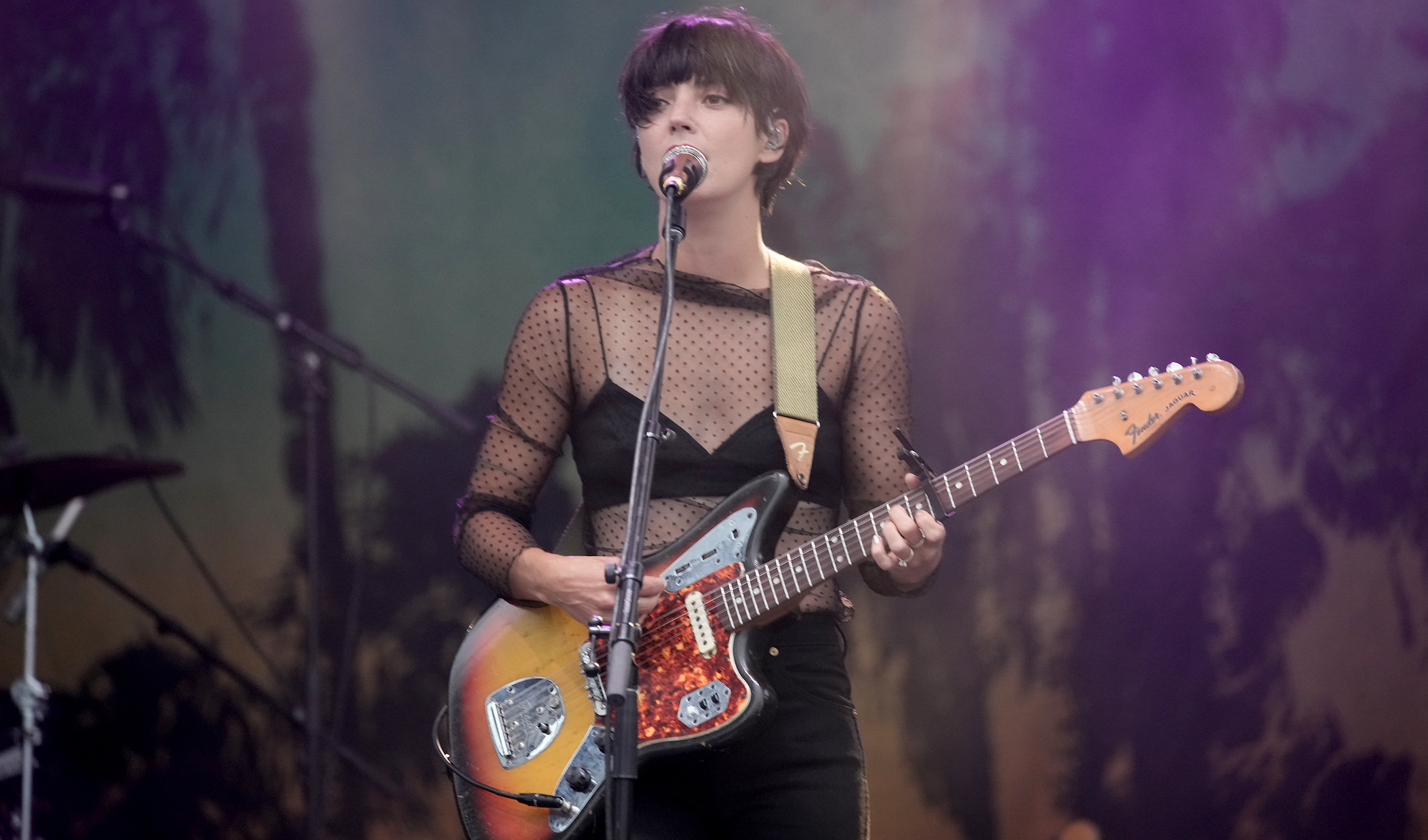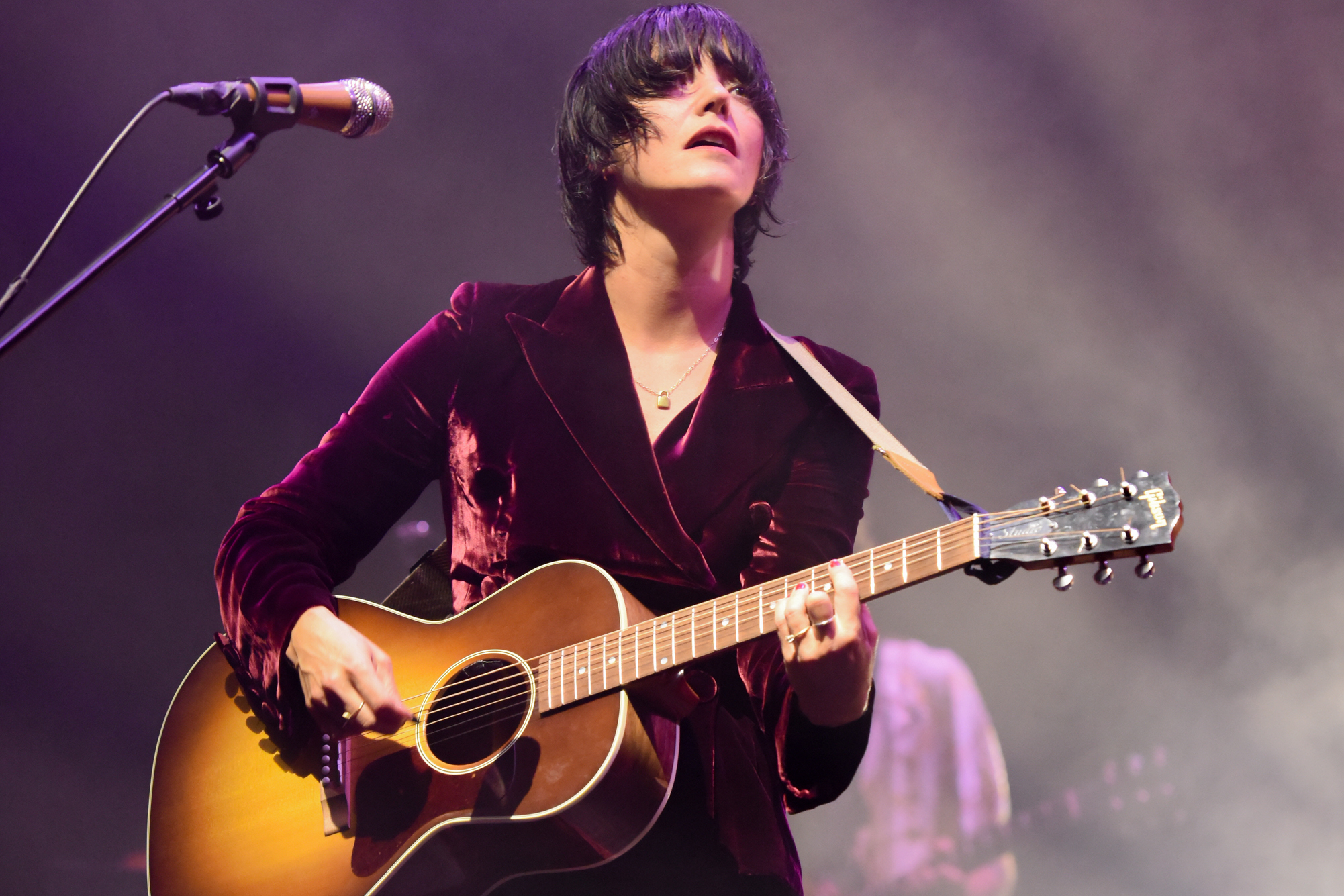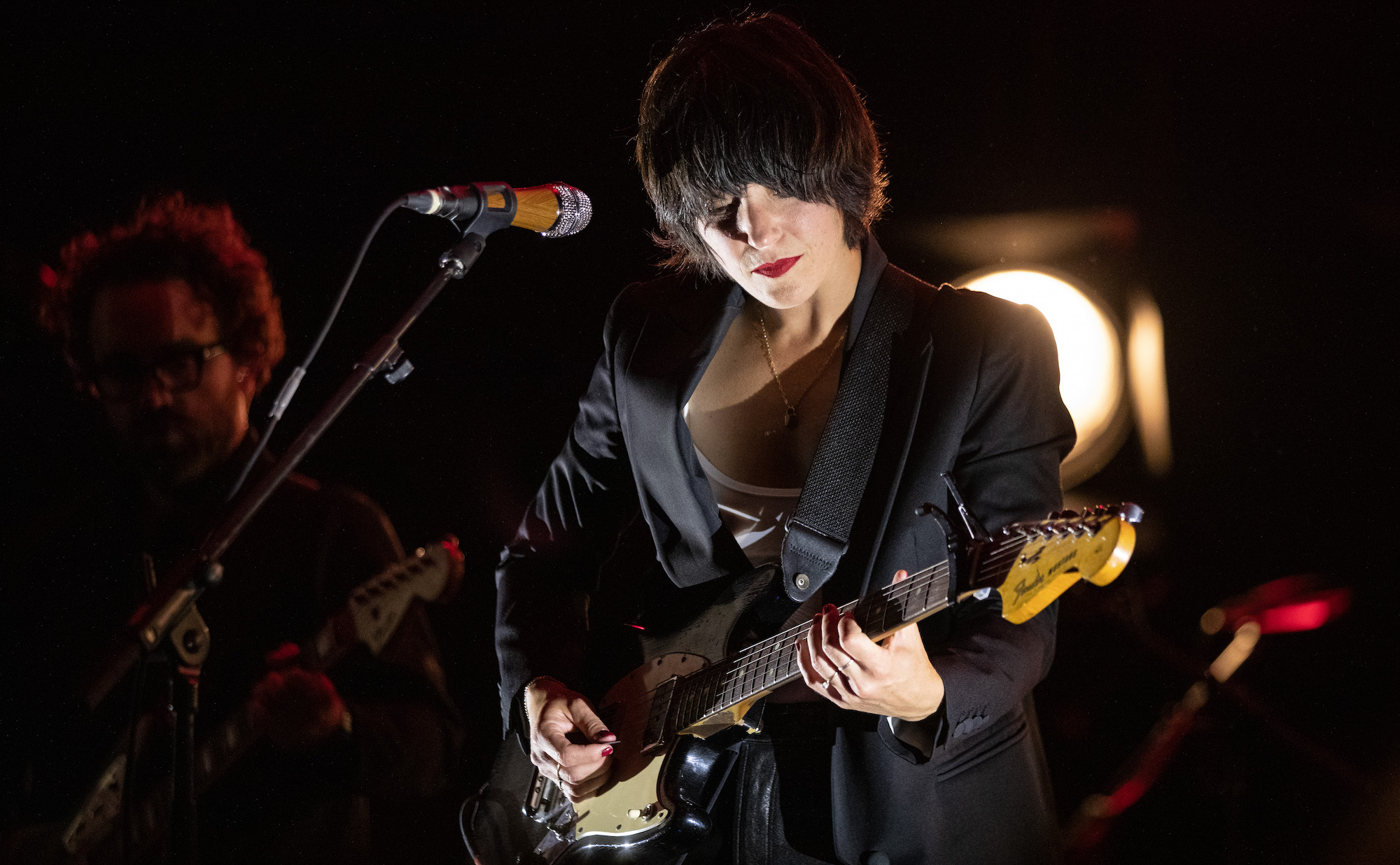Sharon Van Etten: "I loved the Jaguar – it added all these undertones that enhanced the darkness I was trying to express. That definitely changed the way I play guitar"
The New Jersey native discusses her love of the Gibson ES-135 and the pitch-shifter delay she can't stop using, and reveals how an encounter with Aaron Dessner's Fender Jaguar changed the way she approached the instrument

At the moment, Los Angeles-based singer-songwriter Sharon Van Etten is between two important musical points in her life. Van Etten released her latest album, We’ve Been Going About This All Wrong, last May. 2022, though, also marked a significant anniversary – 10 years since the release of her life-changing LP, Tramp. So, she wonders, how to celebrate?
Here, we caught up with Van Etten as she navigates some upcoming writing sessions – both solo and with her band – and, of course, enjoys her time as the mother of a young, music-loving son who recently began his own six-string journey with one of his mother's hand-me-down guitars.
The New Jersey native has released six full-length albums to date, with We’ve Been Going About This All Wrong in particular taking her sound in new and fascinating directions. In conversation with Guitar World, Van Etten discusses her songwriting style, early guitar heroes, and her fondest early guitar memories.
Just off the bat, what is your favorite memory involving a guitar?
“There’s been an acoustic guitar that’s been circulating my dad’s family [since] the '50s or '60s. It was an old Frontier acoustic guitar that whenever we went over to my grandparents’ house for holidays and family gatherings, the kids would end up with it in one of the rooms while the adults were hanging out. My uncle gave the guitar to my older brother at one point, and we brought it back to our home.
“So, this acoustic guitar became a member of our family, but my older brother definitely was jamming on it very heavily. It was his coveted item. But whenever he would go out, I would sneak in and play it, because it was kind of off limits to anybody else at that point.
"So, whenever he went out with his friends, I would play it and had no idea what I was doing. But it was this thing that was off limits, so I definitely wanted it. He would come back home, and it would be out of tune, and it would be this funny cat-and-mouse thing for a while. But then, one time I had been playing it so much while he was gone that my fingers started bleeding, because it still had the original strings on it from, like, ’62 or whatever.
Get The Pick Newsletter
All the latest guitar news, interviews, lessons, reviews, deals and more, direct to your inbox!
"When he saw that, instead of coming and yelling at me for playing his guitar without his permission, he asked if he could write me out some jazz chords so I could learn how to play them. So he started writing me some guitar tabs so I could start practicing. It was one of our first connections growing up, having a similar thing in common.”
What made you want to play it? And who were some early heroes of yours who also did so?
“Just the initial tactile feeling of the guitar and feeling the vibrations through your body is pretty fantastic even if you’re terrible. [Laughs] It resonates with your whole body. For me, I was a real quiet kid, I was introverted. So, to be able to go to a room and close the door and be able to connect with something without having to say anything, it was kind of like my safe place.
“I grew up with a couple guitar books around. In the '60s, I feel like everybody kind of dabbled, and both of my parents had Carole King songbooks and Bob Dylan and Beatles songbooks. Even though I didn’t know their catalogs that well when I was younger, I would still imitate the tabs in the guitar books and make up my own melodies to the chords I was playing, and sing the words without really knowing what the song was yet.
“I didn’t really start to try and play in front of people until high school when my friends said, ‘Oh you play guitar, what are you doing with it?’ I didn’t really write my own songs yet, I was just kind of learning how to strum and sing at the same time, which is hard enough. But then my friend Alexa in high school played me Ani DiFranco.
"She was one of my first girl friends that I made when I first went to high school, and she introduced me to a lot of music like Tori Amos and Ani DiFranco. Because, I liked rock music, but it’s not as accessible when you’re just learning guitar and you’re not playing in a band. I felt like Tori and Ani at that time in the 90s, they definitely spoke to me. Billy Bragg also. The voice and the guitar and the humor, the wit.”

Did you ever meet Ani or Tori?
“No, I never met them. I just had their cassettes! Even more recently, I haven’t gotten to meet them, we just haven’t crossed paths. But [Ani] covered one of my songs with Afghan Whigs [A Crime], which is crazy to think about! Hopefully [I’ll meet them] one day.”
Your third album, Tramp, celebrated its 10th anniversary last February. How did you think about that album in terms of the guitar?
“Aaron Dessner, who produced the record, introduced me to the [Fender] Jag[uar], and that was when I was still learning to step out a little bit.
"I had just made Epic [Van Etten's 2010 album] and I had a hollow-bodied Gibson ES-135, which I love! I loved it for how it was, like, the middle ground between an acoustic and an electric. I could strum and it felt tougher than an acoustic. But, for me, it's baby steps – I’m always afraid of change!
“Aaron helped me step out a little bit. He had the Jag sitting around, and when he was playing over some of the demos that I had shared with him, I loved the tone.
"I’ve never been, like, a heavy tech person – I’m all feel. I won’t know what something is, but if I hear it or I play it and I like how it sounds or feels then that’s what I go with. I’m learning more as I’m getting older about brands and models, but until I play it myself, I don’t really have an opinion.
“So, I played the Jag, and I loved it. I loved the grit and how it cut through everything, but it also added all these wonderful undertones that enhance the darkness that I was trying to express. That definitely changed the way I play guitar. I wanted to try to learn how to play more – not necessarily solos, because I don’t know how to rip like that quite yet, but just not be afraid to have the guitar stick out a bit more instead of support.”
Your latest album, We’ve Been Going About This All Wrong, is less guitar- and more keys-centric, though it does open with acoustic. How has your relationship with the guitar evolved over the past decade when it comes to your songwriting and recordings?
“I still play guitar all the time, and I sometimes start the writing process on a guitar just because it’s much easier to pick up and travel with. Sometimes, those songs just end up on keys because the way that I’m singing it or because the tonality of an acoustic guitar [can] take you out of character, or is too much of a specific character.
“But I’ve also been playing guitar for so long that I feel like sometimes I get in a rut where I’m just writing the same chord progression, or I’m sticking to the same rhythms. So I think it’s good to step away and play something else where you have different intuitions, and then when you return to the guitar, sometimes it feels like a new instrument.
"It helps me to write in a different way now. Like, I’ll pick up the guitar now and I’m like, ‘Okay I’m going to...’ It’s not like I’m starting over again, I’m just trying to look at it in a different way, and that helps me.”
Your voice can be so big and epic, but it’s also tender and vulnerable. How do you think about blending your voice when it comes to the guitar?
“I mean, I usually try to match it, you know? When I’m putting the mix together for a song, I don’t like to be over the mix, because it doesn’t feel natural to me, but it also depends on the part of the song. Sometimes, the song will want to take over the vocal and kind of dampen what I’m actually saying. Depending on what it is I’m saying, I don’t always want people to hear me, or maybe the music is more important than what I’m saying. You’ve got to make those choices sometimes.
“With this last record, that first song [Darkness Fades], that’s probably the most sparse. I wanted people to hear me and the guitar and feel that intimacy, while also opening the door and unfolding the new universe and new orchestration. That’s on the opening track.
"I’m still learning how to let people in and hear what my voice sounds like, and hear that it’s me and the guitar at the center of all these songs, but then, as the instrumentation and production take over, they can hear that it ebbs and flows. But I still like to remind the listener that it’s still me!”
Do you have any favorite guitars for writing and playing? Or favorite pedals or amps?
“I have this ’71 Martin that I love. I still love my 1965 Jag that I’ve kept around. I have a newer Jag, too, that I have in my studio, and my older Jag, the ’65, comes on tour. His name is Oscar because he’s super grouchy! I also have a 1965 Mustang that Jessie [Stein] from Luyas gave me. It’s rad because it’s kind of the opposite world of the Jag – it cuts through a lot more.
"It’s [on] the higher end, [with] higher treble. It cuts through in a different way than the Jag on the lower side. It has more clarity than the Jag – the Jag is a bit gnarlier. And I love MXR pedals. The MXR distortion and the MXR delay, they’ve been pretty solid on my pedalboard.”
Do you have a big pedalboard?
“No, it’s usually pretty small. I have an acoustic setup with a tuner and a D.I., and for my electric, depending on the setup, I just have four pedals. A tuner pedal, delay, distortion and reverb. I have different kinds of reverb that I’m still learning how to love.
"It’s hard to figure out what works live, but I just started messing around with a Boss PS-2 digital pitch shifter delay pedal, and that’s been pretty fun. I try to keep it minimal just because when I’m singing so much and playing so much, I fuck up the timing of hitting the pedals.
"I’ve just never had good timing like that. I like it in or out, you know? If there’s one change on a song, if you want to put on the overdrive on the last lift... but I try to keep it pretty straightforward.”

Does the instrument factor into The Wild Hearts Tour at all with you, Angel Olsen and Julien Baker? Are there, like, post-show hang-out jams?
“We definitely try to collaborate some, and we play together for sure and play each other records. There’s been this Hummingbird guitar that’s been floating around between Angel and I that's actually in my possession right now – that’s pretty sweet.
"We just want to keep – between Julien, Angel and I – the conversation flowing, to keep doing more stuff together, because it was a wonderful tour and all of our bands just got along so well. I feel like it could be this summer camp that continues to exist, and hopefully it will.”
Any future plans for your relationship with the guitar? For instance, you have a young son, any plans to teach him?
“Yeah, I mean, my son loves music, he plays pretty much everything. I gave him my old Kay guitar, it was one of my first acoustics I bought in New York. And I’m writing right now, I’m trying to write and learn a new flow for the studio now that I’m back into it. It’s been a second.
"I’m trying to figure out what it is I want to say right now. I think there’s a lot to reflect on in the last couple years – you know, instead of looking back, do I look forward? I don’t know!
“I’m trying to figure out something special to do around Tramp. Because that was such a – I don’t mean to use this word because it sounds cliché – pivotal moment for me [in terms of] branching out and leaning more into the rock side that I hadn’t before. So, I want to try to figure out how to honor that and pay respects [to] that record, but I don’t know how to do that yet.”
Finally, what do you love most about the guitar?
“I love that I have one wherever I am, you know? It’s still this friendship that I’ve been building since I was a kid. You can pick up any guitar and it feels different – they have their own personalities. [There's] also, the player, you know? I think it’s so interesting that you can have the same guitar with different players, and it can sound completely different. But yeah, it’s growing with me, I’m still learning a lot and I still have so much more to learn.
“I’m hoping to get more and more into guitar again as I’m shaking off the synth vibes, but we’ll see what happens. I’m actually going to the desert to write with my band, as a band, for the first time. So, I’m going to try to pick up the guitar just like I’m in the band!”
- The deluxe edition of Sharon Van Etten's We’ve Been Going About This All Wrong is available now via Jagjaguwar.
“It holds its own purely as a playable guitar. It’s really cool for the traveling musician – you can bring it on a flight and it fits beneath the seat”: Why Steve Stevens put his name to a foldable guitar
“Finely tuned instruments with effortless playability and one of the best vibratos there is”: PRS Standard 24 Satin and S2 Standard 24 Satin review









